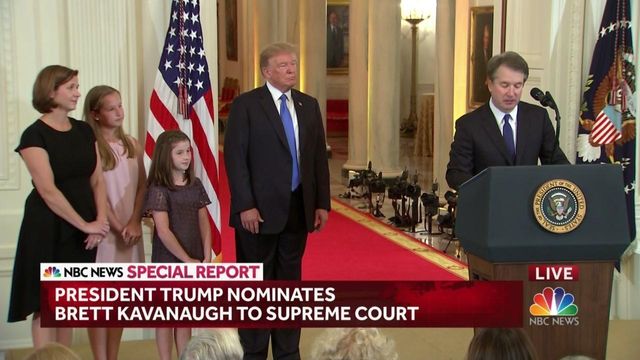Kavanaugh Frequently Asked Questions on the Person and the Process
President Donald Trump on Monday nominated Judge Brett M. Kavanaugh for the Supreme Court. Here's what happens next and what you can expect.
Posted — UpdatedPresident Donald Trump on Monday nominated Judge Brett M. Kavanaugh for the Supreme Court. Here’s what happens next and what you can expect.
Brett Michael Kavanaugh, 53, is a federal appeals court judge, former aide to President George W. Bush and onetime investigator of President Bill Clinton, working under Kenneth W. Starr.
He has written countless decisions applauded by conservatives on topics including the Second Amendment, religious freedom, the environment and campaign finance.
Kavanaugh has also formed lifelong friendships with liberals, many of whom praise his intellect and civility. In his professional life, before he became a judge, he was often a moderating force.
Soon Kavanaugh will begin making “courtesy visits” in the Senate. These are private meetings — though they often begin with highly choreographed photo opportunities — that offer senators a chance to quiz the nominee on his or her judicial philosophy, past rulings and public statements. Senators also find them useful political tools.
In 2009, for instance, controversy erupted over a 2001 comment by Sonia Sotomayor, a judge at the time, in which she suggested that a wise Latina might have better judgment than a white man. Unwritten protocol dictates that nominees do not speak publicly until their confirmation hearings, so Sotomayor remained silent in the face of criticism.
But she discussed the comment with Sen. Patrick J. Leahy, D-Vt., during their courtesy visit, and took the unusual step of giving the senator permission to recount their conversation. “What she said was, of course one’s life experience shapes who you are, but ultimately and completely — and she used those words, ‘ultimately and completely’ — as a judge you follow the law,” Leahy explained.
The next year, it was Elena Kagan’s turn. Kagan, then the solicitor general, faced questions about her lack of judicial experience and her stance on the military. Democrats defended her but also used their meetings with her to show off her lighter side; Sen. Richard J. Durbin, D-Ill., reported that Kagan, who once taught law at the University of Chicago, liked Medici Pizza in Hyde Park, Chicago hot dogs and baseball games at Wrigley Field.
Kavanaugh will get expert help from a team assembled by the White House.
When Sandra Day O’Connor was nominated in 1981, for instance, her team included a 26-year-old Justice Department lawyer named John G. Roberts Jr. He provided her with draft answers to likely questions and helped quiz her at the mock hearings — sometimes called murder boards.
In a memorandum to a supervisor, Roberts described his philosophy: “The approach was to avoid giving specific responses to any direct questions on legal issues likely to come before the court, but demonstrating in the response a firm command of the subject area and awareness of the relevant precedents and arguments.”
He took his own advice when he was nominated to be chief justice in 2005. He showed an easy familiarity with constitutional doctrine in his hearing, effortlessly summoning the names and summarizing the details of old decisions without indicating how they would apply to new controversies. Durbin declared that Roberts “retired the trophy” for an outstanding performance by a judicial nominee.
Trump has relied on a cohort of influential conservative lawyers, and to a lesser extent his usual circle of friends and associates, for advice on choosing a nominee. Leonard Leo, an executive vice president of the Federalist Society, prepared a list of candidates for Supreme Court seats for Trump, and it has guided Trump’s choices. Justice Neil M. Gorsuch came with a Federalist Society seal of approval; all four of the finalists this time are drawn from Leo’s list, which has grown to 25 names.
The White House counsel, Donald F. McGahn II, is the president’s most influential in-house adviser. He, too, is a longtime member of the Federalist Society. But Trump also speaks with outsiders, such as his personal lawyer, Rudolph W. Giuliani, and Fox News host Sean Hannity. And he takes calls from influential members of Congress, most notably the Senate Republican leader, Mitch McConnell of Kentucky.
The White House will roll out an intensive campaign to sell the nominee to the Senate and the American public. The campaign could include television commercials, including some targeted at politically vulnerable Democrats running for re-election in states won by Trump in 2016. The nominee will embark on a busy schedule of courtesy calls to members of the Senate Judiciary Committee and other senators.
The White House had already sent Congress background packets on the four finalists for the seat: Kavanaugh, Thomas M. Hardiman, Raymond M. Kethledge and Amy Coney Barrett. Trump will play a prominent role in promoting the credentials of Kavanaugh, though his task will be complicated by the fact that he will be in Europe for a week after making the announcement Monday evening.
• Credits
Copyright 2024 New York Times News Service. All rights reserved.





